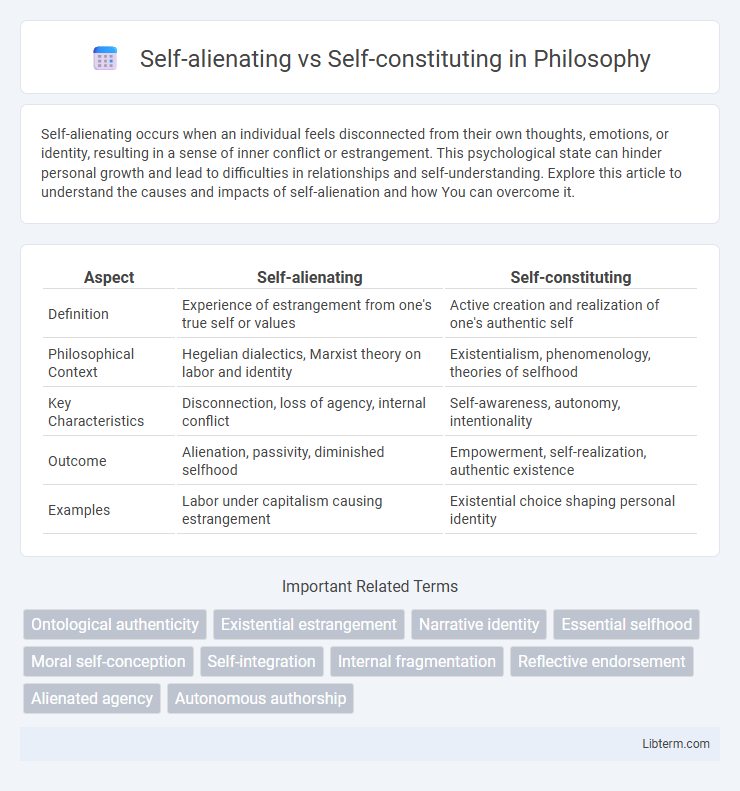Self-alienating occurs when an individual feels disconnected from their own thoughts, emotions, or identity, resulting in a sense of inner conflict or estrangement. This psychological state can hinder personal growth and lead to difficulties in relationships and self-understanding. Explore this article to understand the causes and impacts of self-alienation and how You can overcome it.
Table of Comparison
| Aspect | Self-alienating | Self-constituting |
|---|---|---|
| Definition | Experience of estrangement from one's true self or values | Active creation and realization of one's authentic self |
| Philosophical Context | Hegelian dialectics, Marxist theory on labor and identity | Existentialism, phenomenology, theories of selfhood |
| Key Characteristics | Disconnection, loss of agency, internal conflict | Self-awareness, autonomy, intentionality |
| Outcome | Alienation, passivity, diminished selfhood | Empowerment, self-realization, authentic existence |
| Examples | Labor under capitalism causing estrangement | Existential choice shaping personal identity |
Understanding Self-Alienation: Definition and Origins
Self-alienation refers to the experience of being estranged from one's own identity, thoughts, or feelings, often resulting in a loss of authentic self-awareness. This phenomenon originates from social, psychological, or cultural pressures that compel individuals to conform, leading to internal conflicts and a disconnection from true desires or values. Understanding self-alienation involves exploring its roots in existential philosophy and psychoanalysis, which emphasize how external forces distort self-perception and hinder self-constitution.
What Does It Mean to Be Self-Constituting?
Being self-constituting means actively creating and defining one's own identity and existence through autonomous choices and actions. It emphasizes the capacity for self-determination, where an individual shapes their values, beliefs, and life path without external imposition. This contrasts with self-alienation, where individuals feel disconnected from their authentic selves, often due to societal pressures or lack of agency.
Core Differences: Self-Alienating vs Self-Constituting Selves
Self-alienating selves experience a disconnection from their authentic identity due to external pressures or internal conflicts, resulting in a sense of estrangement from their true desires and values. In contrast, self-constituting selves actively shape their identity through reflective self-awareness and intentional actions, aligning their behavior with intrinsic goals and beliefs. Core differences hinge on alienation involving loss of agency and authenticity, while self-constitution emphasizes empowerment and coherent self-definition.
Psychological Effects of Self-Alienation
Self-alienation results in psychological effects such as decreased self-esteem, heightened anxiety, and a pervasive sense of internal conflict. This disconnection from one's authentic desires or values fosters feelings of emptiness and cognitive dissonance that impair mental well-being. In contrast, self-constituting supports psychological integration and resilience by affirming one's identity through autonomous choices and self-awareness.
The Power of Self-Constitution in Personal Growth
Self-constitution empowers individuals to define their values and actions, fostering authentic personal growth distinct from external pressures that cause self-alienation. Embracing self-constitution leads to intentional identity formation and enhanced psychological resilience. This process unlocks autonomy and purposeful evolution, essential for sustained well-being and fulfillment.
Factors That Lead to Self-Alienation
Factors that lead to self-alienation include a lack of authentic self-expression, external pressures to conform, and disconnection from personal values and desires. Psychological influences such as low self-awareness, internalized societal norms, and persistent external validation can diminish one's sense of agency and identity coherence. These elements hinder self-constitution, which requires integration of experiences and intentional self-creation.
Pathways to Becoming Self-Constituting
Self-constituting individuals actively shape their identity through intentional choices and reflective self-awareness, contrasting with self-alienation, where individuals feel disconnected from their authentic self. Pathways to becoming self-constituting involve cultivating autonomy, embracing personal values, and engaging in continuous self-reflection to align actions with one's true identity. This process promotes coherence between lived experiences and self-perception, fostering psychological well-being and authentic agency.
Social and Cultural Influences on Self-Identity
Self-alienating experiences often arise from social pressures and cultural norms that conflict with an individual's authentic values, leading to a fragmented sense of self. In contrast, self-constituting identities develop through active engagement with cultural narratives and social roles that affirm personal agency and coherence. The dynamic interplay between societal expectations and cultural contexts shapes whether an individual experiences alienation or empowerment in their self-identity.
Overcoming Self-Alienation: Practical Strategies
Overcoming self-alienation involves reclaiming authentic identity by aligning actions with intrinsic values and emotions, fostering self-awareness through mindfulness, and engaging in reflective practices such as journaling or therapy. Embedding purposeful activities that resonate with personal beliefs strengthens the self-constituting process, enabling individuals to construct coherent and integrated self-narratives. Consistent efforts towards self-acceptance and critical examination of external influences reduce internal conflict, promoting psychological well-being and sustained personal growth.
Choosing Authenticity: Embracing a Self-Constituting Life
Choosing authenticity involves embracing a self-constituting life where individuals actively shape their values, beliefs, and actions, fostering genuine self-expression. Unlike self-alienating behaviors that create disconnection from one's true identity through external pressures or conformity, self-constitution empowers autonomy and personal coherence. This process enhances psychological well-being by aligning choices with intrinsic motivations, facilitating meaningful engagement with the world.
Self-alienating Infographic

 libterm.com
libterm.com